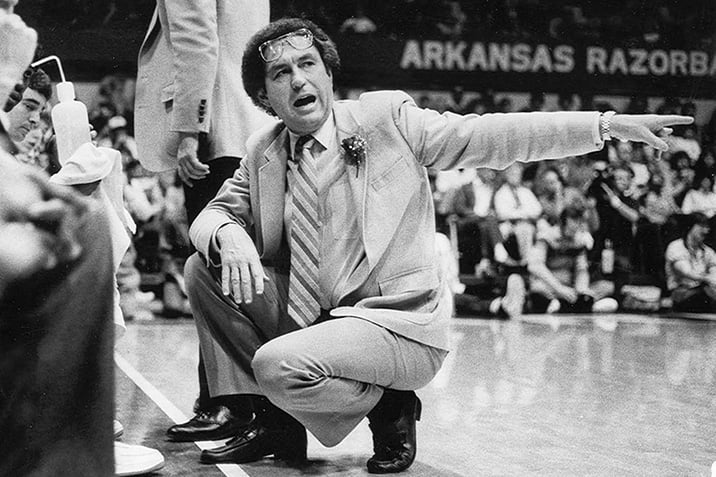
Photo: ArkansasRazorbacks.com
There was basketball at the University of Arkansas before Eddie Sutton, it’s just that very few people outside of Fayetteville cared all that much about it.
When Arkansas athletics director and head coach Frank Broyles hired Sutton away from Creighton in 1974, it was the first step to changing all of that.
Everything most of us have ever loved about the Razorback basketball program started with Sutton putting his faith in Broyles, and Broyles putting his faith in Sutton.
Sutton had a vision of the type of program Arkansas could be, and through his work and perseverance with the support of Broyles and Razorback fans, he took a mediocre program at best and made it into one that was nationally relevant.
That’s why the passing of Sutton, 84, last Saturday in Tulsa weighs heavily on the hearts of many Razorback fans who remember his time at the UA.
Sutton was a fantastic coach. His 800-plus victories tell that story. He was the first college coach to guide four programs — Creighton, Arkansas, Kentucky and Oklahoma State — to the NCAA Tournament, and he led Arkansas and Oklahoma State to the Final Four.
Anyone that followed college basketball knew he was a Hall of Fame coach well before the voters for the Naismith Basketball Hall of Fame relented and finally did the right and honorable thing by voting him in last month. Unfortunately for Sutton, his family and players, he was too ill to fully enjoy the honor.
As fellow Hall of Famer Nolan Richardson recently said Sutton should have been voted in 15 years ago.
I met and interviewed Sutton only a handful of times, and it was well past his time as the head Hog. The first was a phone interview in the fall of 1989 as a reporter for the UA campus newspaper the Arkansas Traveler in between his jobs at Kentucky and Oklahoma State. Next was at the 1995 Final Four, and then several times later.
Like most Arkansas fans I didn’t appreciate his “crawl to Kentucky” line that was meant to ingratiate himself in the Bluegrass State more so than to denigrate Arkansas as a state or a program.
If there was any ill intent in the comment, it was aimed at Broyles not Arkansas fans, and I honestly don’t think Sutton believed that comment would make it back to the fans of Arkansas, anyway.
The reason I say that is because every time I interviewed him and in every story that I’ve read where he spoke about Arkansas, there was only affection in his words, tone, and attitude for the Razorbacks and the program.
You also hear that from his former Razorback players when they speak of the coach, who was like a second father to so many of them.
Obviously there was some fate to Sutton’s success at Arkansas. Having all-time greats like Marvin Delph, Ron Brewer, and Sidney Moncrief come along within the same period was lucky, but Sutton convincing the Triplets to stay home so they together could elevate Arkansas’ program wasn’t.
Any of the three could have gone to more notable programs at the time, but Sutton drew them together with his vision of what Razorback basketball could be. Of course Sutton went on to recruit other notable talents such as Scott Hastings, Darell Walker, Alvin Robertson, Joe Kleine and so many others.
With his motto of “discipline, dedication, and defense,” Sutton and his hard-working players busted their tails to make Arkansas basketball important in the state and the nation. The foundation he built and left for Richardson, gave Nolan the platform to build a national championship program and put the Razorbacks on top of the college basketball world in 1994.
Even though the program has struggled to be as relevant in the 21st century as it was in the last quarter of the 20th century, what Sutton and Richardson constructed at Arkansas allowed current Arkansas athletics director Hunter Yurachek to attract a coach like Eric Musselman, who like Sutton, has a vision for Razorback basketball that’s far beyond mediocre.
Musselman won enough at Nevada that he was going to take over a Power 5 program at some point. Much of what made Arkansas so attractive to him is what Sutton and Richardson accomplished with the Razorback program. Their successes give him faith that he can build his own successful program.
Sutton planted seeds way back in 1974 that are still bearing fruit today. Without the foundation that Sutton built at Arkansas, the success that Richardson attained and the vision Musselman and his staff are working so hard to tangibly build right now would not be possible.
Since 1974 whatever Arkansas basketball has been and what it will be in the future can be traced back to Eddie Sutton and his vision for Razorback basketball.
That’s not Sutton’s only legacy in college basketball, but I’d argue it’s his greatest.

